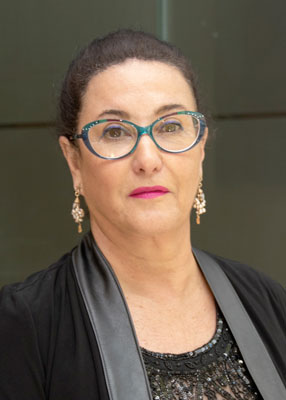 Ronit Elk, Ph.D., is the study's co-principal investigator and associate director of the Southeast Institute for Innovation in Palliative and Supportive Care at UAB. Roughly 60 million United States citizens who live in rural areas do not have access to palliative care, and even when palliative and hospice services are available, studies have found that African-Americans are more likely to receive medically ineffective, poor-quality care than are Caucasians, according to researchers at the University of Alabama at Birmingham.
Ronit Elk, Ph.D., is the study's co-principal investigator and associate director of the Southeast Institute for Innovation in Palliative and Supportive Care at UAB. Roughly 60 million United States citizens who live in rural areas do not have access to palliative care, and even when palliative and hospice services are available, studies have found that African-Americans are more likely to receive medically ineffective, poor-quality care than are Caucasians, according to researchers at the University of Alabama at Birmingham.
“By living in a rural area, people with serious illness have a very high risk of not getting the right care,” said Ronit Elk, Ph.D., the study’s co-principal investigator and the associate director of the Southeast Institute for Innovation in Palliative and Supportive Care at UAB. “There are long distances to treatment centers, not enough health care professionals, and of those who are health care providers, there are very few with palliative care clinical experience.”
To provide adequate palliative care, Elk and a team of researchers will provide a culturally based palliative care program provided through telehealth in three rural hospitals in the Southeast, and compare that to patients receiving regular care, to see if it helps reduce suffering for patients, increases patient and family quality of life, and reduces the burden of care for caregivers.
Researchers will study 352 hospitalized African-American and white older adults with life-limiting illnesses in three rural, community hospitals in Aiken, South Carolina, Alexander City, Alabama, and Picayune, Mississippi. None of the hospitals have palliative care resources or palliative team members.
The care via telehealth will be provided by three different palliative care physicians, including Rodney Tucker, M.D., director of the Center for Palliative and Supportive Care at UAB.
“The physicians in this study are excited about partnering with hospitalist colleagues in rural hospitals, as well as the members of the community and the other interdisciplinary team members including nursing and pastoral care,” Tucker said. “One of the hopeful downstream effects with this study is that we may see an increased percentage of patients who wish to remain in their community hospital or in their homes rather than traveling to a larger medical center. This would be exciting for our rural hospitals as well.”
The physicians will not be the only ones involved in this process. The researchers will take a team approach to care, including a community advisory group, the hospitalist from each hospital and the patient’s on-site care providers.
“This method is called community-based participation research, which is a method where academics partner with communities,” Elk said. “It has been proved over and over to reduce health disparities. The community advisory group guides the study.”
According to Elk, even when palliative and hospice services are available, numerous studies have shown that African-Americans underutilize it. The reasons for this include a lack of exposure to hospice and palliative care and a different cultural perspective when it comes to end-of-life care and support.
“African-Americans often value faith, spiritual beliefs and the guidance of a pastor when coping with illness and making treatment decisions,” Elk said. “Yet physicians rarely ask patients about their spirituality. African-Americans’ reliance on hope and faith in God’s healing power can be at odds with the physician’s need to share a terminal prognosis.”
Hope is key when it comes to communicating with African-Americans about future medical and/or end-of-life plans. Elk says training health care providers how to have these conversations will be part of the study.
In the pilot study upon which this randomized control trial is based, African-Americans said, ‘don’t speak to us about hospice, we don’t want to give up hope that there is a chance for recovery.’ “They also did not want to talk about advanced care planning with their physician,” Elk explained. “In this study, the palliative care physician will follow a culturally based protocol on how to approach end-of-life care with the patient based on his or her cultural preference.”
The information and feedback from the community advisory group will be instrumental in guiding the health care providers as they treat their patients and communicate with family members. In each location, the group will be made up of professionals from hospice, family members of a loved one who recently died, patients facing serious illness who are well enough to participate, and pastors and community leaders.
“The community advisory group will be the ones who guide the study before, during and after it ends,” Elk said. “They are incredibly invested in this because it will help their own communities. If we find that approaching end-of-life conversations in ways that are culturally preferred is effective, this could become the gold standard of future palliative care.”
The study will last for five years. Marie Bakitas, DNSc, a professor in the UAB School of Nursing and the associate director of the Center for Palliative and Supportive Care, is the other principal investigator.